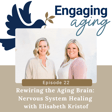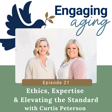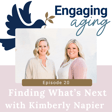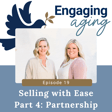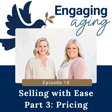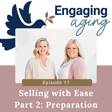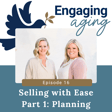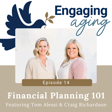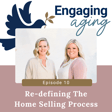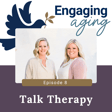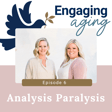Become a Creator today!Start creating today - Share your story with the world!
Start for free
00:00:00
00:00:01

The Almighty Dollar: Tapping into the Equity in Your Home!
For many older adults, their wealth and largest investment is their long-time home. Erin DiCarlo welcomes Elder Law and Estate Planning Attorney, Zach Smolkin, along with Matt Lazowski, Home Equity Conversion Mortgage (HECM) specialist at Fairway Mortgage to demystify reverse mortgages. Join the conversation as Erin, Zach, and Matt look at the traditional reverse mortgage product, a HECM to purchase, and how a HECM can truly help older adults access the equity in their home and allow for some significant estate planning to be done, ensuring their needs are being met later in life.
Transcript
Welcome and Introduction
00:00:02
Speaker
Welcome to Engaging Aging with Erin and Lauren. Join us as we share laughter, tears, and demystify the realities and silver linings that occur later in life. Welcome to today's episode to all of our listeners. My name's Erin DiCarlo here with Dovetail Companies, and today we are talking about the almighty dollar. How to really tap it into the equity in your long time home to fund your future.
00:00:31
Speaker
And for many older adults, their wealth and their investment may be their home as their largest investment.
Understanding Reverse Mortgages: Professionals Weigh In
00:00:39
Speaker
So we're here, very excited to bring to you today, Zach Smolkin, who is an estate planning attorney, as well as Matt Lazowski with Fairway Mortgage. He is our, what we call, HECM, Home Equity Conversion Mortgage Specialist. And we really wanna demystify reverse mortgages.
00:00:59
Speaker
So I'm going to start with you, Matt, if you can really just explain what is a reverse mortgage or a home equity conversion mortgage.
00:01:10
Speaker
Sure, sure. Thanks for having me here, Aaron, today. It's great to be here with you and Zach. So a reverse mortgage is the global term for two types of mortgages. The home equity conversion mortgage is the mortgage that's specifically insured by FHA and regulated by FHA. And then there's proprietary types of mortgages that we call reverse mortgages.
00:01:34
Speaker
So we'll talk about the HECM. They're essentially the same. There's some very My new details and differences but as relates to our listeners today I think the HECM is is the topic and so what it is essentially it allows people who are 62 years age
Eligibility and Misconceptions of HECM
00:01:51
Speaker
or older. So that's an important Point is we must be 62 years age or older to qualify Okay, and then what we do is we look at
00:02:01
Speaker
The equity in one's home and based on one's age and the current interest rates, which are determined a little bit differently for reverse mortgages than say regular mortgages, we can determine how much they can borrow. And in today's world, there are about 12 to $13 trillion of equity tied up in homes, which is the number one source of equity in all of America more than IRAs and 401ks.
00:02:28
Speaker
Great, thank you for that explanation. Now, for all of us in the aging space and in the elder care world, reverse mortgages have had a little bit of a bad rap through the time, through decades. Zach, question for you. You are here as an estate planning attorney really talking about the benefits of reverse mortgages. Can you talk a little bit about, you told a story about talking with a professional last night and what came up. Can you share that story with us?
00:02:54
Speaker
Absolutely. So yesterday I was talking to a friend and I said I was doing this podcast on reverse mortgages and she's in banking and she kind of gave me a look like why would you do that? And I think she like many other people are in the world of 25 years ago where the only reason to do a reverse mortgage or a HECM
00:03:15
Speaker
It would be if you're in distress and you can't pay your mortgage However, there are so many other things that you can do if you free up money from your home As far as moving assets to your children or down the line to your grandchildren through estate planning So having that extra money there available Is a great opportunity. This is a great way to get that money
00:03:37
Speaker
So interesting you bring up, um, obviously in your title is estate planner. I think when we talk about planning for our future, um, it's an oxymoron to say I'm in crisis and need to plan, right?
HECM in Estate Planning
00:03:51
Speaker
So in your professional opinion, tell us about these HECM products in pre-planning in those earlier stages, maybe at 62 and not 82.
00:04:00
Speaker
Absolutely. Many clients want to make gifts or do other planning, but they just don't have the ability to. You can't give away your home. That's where you're living. That's where you're going to be hopefully until you die. So the ability to access some of the equity in there without having the obligation to continually make payments allows you to free up that money to be able to give gifts, to be able to do other estate planning techniques that we can get into a little bit later. But having that lump sum of money there available to you
00:04:29
Speaker
Really freeze up your ability to do significant planning great so matt on that point. Why is it beneficial for someone to consider this product sooner rather than later what monetary value does that bring to the table to be considering these options at sixty two verses eighty two for example.
00:04:48
Speaker
Good question. So I think there's two categories. There are the categories of people who say it's 62 years of age, they're going to wind down, maybe they got a package to leave their job, and now their income isn't what it used to be.
00:05:04
Speaker
And so they have a continual mortgage payment and their cash flow isn't there. So in this case, a reverse mortgage is going to dramatically benefit them from reducing that outlay and their cash flow is going to be higher, right? So basically get rid of their mortgage payment and God willing they live to 92. They're living in their house without a mortgage payment. It's incredible.
00:05:29
Speaker
The other way to look at it is let's say somebody has great cash flow and they don't need to get rid of their mortgage payment. One thing they can do is they can get a reverse mortgage and have a line of credit
00:05:43
Speaker
based on the equity that's in their house that they qualify for. And that line of credit grows per FHA regulations at the same rate as the reverse mortgage would. And so that can grow every year compounding. And of course you can check with your accountant, but because it's a home equity, there's no tax implications typically to that. So that growth can compound without any tax incomplete.
00:06:08
Speaker
So this is a very important point that I'd like to spend a little more time talking about in this risky investment
Financial Security and Market Volatility
00:06:16
Speaker
market. And I'm not a financial planner, but I see the news and read the headlines where return on investment has been challenging. Can you speak more about the security and safety of using this product as almost an investment tool for that return on investment as it grows? Am I saying that correctly?
00:06:34
Speaker
Sure, I mean we in the mortgage space would never say use a heck of a line of credit as an investment tool. What we would say is you can leverage your home equity and take advantage of the FHA regulation for that compounding growth.
00:06:52
Speaker
But to your point about safety and risk, things like that, first off, one who gets a reverse mortgage is never personally on the hook for that mortgage. It's backed by the home. It's called a non-recourse loan. You don't have to pay it back if you don't want to as long as you live in the house. And so really the risk is almost minimal to none to the invisible borrower.
00:07:20
Speaker
And secondly, on average, over the past 30 years, home values have appreciated on average 4%, right? So your asset is growing every year, the value of the home as well as that line of credit based on the interest rate. That changes monthly based on the CMT.
00:07:43
Speaker
And I think it's important to address how different this is from a traditional just home equity line of credit, which is income-based, which you have to make payments on. This is a different product. I think sometimes consumers can confuse the two. This is a totally different product. From an estate planning perspective, Zach, what would you advise clients to use this money for as needed through their aging journey?
00:08:07
Speaker
Absolutely. Matt, as you pointed out, they can take that money out and it can grow when it's sitting in their accounts. At the most basic level, right now, you can get 5% on a high-interest savings account. No risk involved at all.
00:08:24
Speaker
That's 20. You can get a significant amount of additional cash flow that you can use to make gifts, to live your life, whatever else you might need that money for as you're aging. However, if you want to make estate planning decisions based on having additional income,
00:08:41
Speaker
We can leverage that in a number of ways. You can buy life insurance with it, take a portion of it, buy a life insurance policy. Life insurance policies have some of the best internal rates of return of any investment you can make because it's guaranteed. And especially given the fact that you can take out
00:08:59
Speaker
Large sum of money you can do a one-pay policy with that and it just goes and it grows and when you die you could turn a hundred thousand dollars into a million two hundred thousand into even more than that depending on your Insurability and and other factors. Why do you think professionals aren't utilizing this to the best of their ability? This is a big question I have because obviously you and I after meeting and learning from Matt We're very excited about this product for planning purposes But why do you think other professionals are not advising this for their clients?
00:09:29
Speaker
I think that they're stuck in the 1990, you know, late 90s state of mind, where the only reason to get a reverse mortgage and the only people who get reverse mortgages are people who are in distress.
Overcoming Misconceptions and Making Informed Decisions
00:09:43
Speaker
And Matt, you can probably speak to that very well from what you've heard from other mortgage professionals and clients, but I think that they're just stuck in that mindset that says, I'm getting a reverse mortgage because I've turned 65, I'm not working any longer, and I can't afford my mortgage payment.
00:09:59
Speaker
So that's the only option I have, whereas I think that this is a potentially an amazing estate planning tool or planning tool moving forward.
00:10:07
Speaker
It's great. I agree with you. And like anything in life, you know, a goal without a plan is just a wish. So if there's a goal to gift or to stay home and bring in care services in the future, how are you funding that plan? And this can be a great tool for that. Let's talk briefly about the crisis later in life person that this could be a great resource for as well. I want to tap on that.
00:10:31
Speaker
Yeah, absolutely. And I've had just in the past month or two, numerous people who are basically penniless and their home is in disrepair. They don't have any family around or I have another gentleman. He still has a mortgage payment. He was just diagnosed in his late sixties in Parkinson's for Parkinson's.
00:10:51
Speaker
And this is going to change his life. So we're going to be able to pay off his existing mortgage, get rid of that monthly mortgage payment. You do have to pay your property taxes and homeowners insurance, but we're significantly reducing his monthly cash outflow.
00:11:08
Speaker
and he's going to have peace of mind that he can now live in his house from here on. And again, God willing, he lives a long time, but the peace of mind is incredible. And from somebody who offers his product and can teach about and teaches about it, I'm passionate, right? It's really, you know, to me, it's yeah, it's a mortgage, but it's truly a financial tool that can be used in a variety of ways. And certainly the loan of last resort is what people have thought about.
00:11:37
Speaker
And it does work for that. And when in those times that it happens, it's an incredible opportunity to better someone's life. That's why we're so excited to really demystify this today. I think Lauren and I always say to our clients, the best decision is an informed one. So really getting the true information and not just like kind of the hearsay of those reverse mortgages of the past. So we hope some professionals are also listening to this today and we'll dive in to learn more about this.
00:12:04
Speaker
I have a question for you, and this really interests Lauren and I and our team. We are senior real estate specialists. Our real estate services specifically focus on supporting older adults. Many of our clients, their longtime home no longer serves them.
00:12:21
Speaker
for a variety of reasons. Sometimes the children are gone and they don't need the four or five bedroom colonial home anymore, or maybe the landscaping and the upkeep is too much.
HECM for Purchasing and Inheritance Planning
00:12:32
Speaker
There is a product where you can use this HECM, Home Equity Conversion Mortgage, to purchase that next home. And before I ask you a question about that,
00:12:41
Speaker
I just want to address this. Many older adults are staying in their homes because they don't have a mortgage and it doesn't make sense to them, typically financially, to sell their home and then purchase for a high price point and lose all of that investment into another property. Please take a few minutes to explain what this product is and how it can help that person, that mature seller, really right size into a new home that fits their needs and their lifestyle.
00:13:09
Speaker
Great question and I'll give you two examples. I'm working with a gentleman now who just sold a house out in Maine. He moved down to Rhode Island. He was diagnosed with a neurological disorder that he knows will get progressively worse. So he moved closer to his son. He's currently staying with his son and we are going through the application process to get him a pre-approval letter.
00:13:33
Speaker
to go out and buy a home with a HECM. And so he's based on his age and the current rates. He can get a $300,000 home. He has to put down around $200,000, but he has that money because he just sold a house.
00:13:48
Speaker
and now he has no mortgage, right? So that's a great example. Another one is in Metro West, homes are well worth over a million dollars. As you said, they're paid for, but there is upkeep. The taxes are very high. What they can do is sell that house, get that million dollars. They can go out and get a comparable house for another million dollars and based on their age, maybe put down 500 or 600, pocket the rest and live without a mortgage.
00:14:17
Speaker
So to explain that one step further, they sell a home for a million dollars, they purchase a home for a million dollars, but they're only putting, let's say, $500,000 or $600,000 down. That other amount, the $400,000 remaining, is the HECM product, so there's no mortgage payment.
00:14:35
Speaker
that difference is paid and does that also grow for them? Would this, as the equity in that property grows, does that 400,000 also grow for them? They can tap into in the future for need. So that 400 is actually the mortgage, right? So they're borrowing that and that does grow. So the reverse mortgage in essentially says,
00:14:58
Speaker
you're having negative amortization so you are borrowing 400 and every year that 400 will grow but keep in mind they already have 60% of equity. Yes. Right so the fear the big fear and you know I think Zach you're your friend who you were speaking to last night the biggest fear is the bank will own my house doesn't the bank own my house.
00:15:20
Speaker
No, the bank owns your house just like the bank owns your house when you have a regular mortgage. I think I have a mortgage and my mortgage company has a lien on my home. I am on title and they are on title. That's exactly how it is in a reverse mortgage. You do not lose ownership of that at all.
00:15:40
Speaker
Now, as the property grows in value, so in the case, a million dollar house you sell, you put down five, six, seven hundred thousand, you have three, four hundred thousand in the bank. Yeah, in the bank. As that home appreciates every year, you theoretically could refinance that reverse mortgage you used to purchase and tap into that equity based on home appreciation. Got it, okay, great.
00:16:07
Speaker
And Matt, I'm sorry, I actually have a question for you, kind of related to this. I have clients all the time whose children move in with them, and they live there together, and they never know what to do, how to get it all equalized, because that child lives there with their family. They lived there for 20 years, and they don't want to kick their kid out when they die. But at the same time, they say, well, what do I do? How do I equalize everything? My house is my biggest asset. So it seems to me that they could take a reverse mortgage,
00:16:37
Speaker
and give that money to the kids. And then I guess maybe you can explain how it would work though when they die. Does the bank then automatically force them to sell the house? Or is there an opportunity to refinance? Or how can they make that work? Because it seems great to me that you could push that down the road a significant amount, having the child take over that house. But you can also equalize your other kids in many ways using that reverse mortgage. That's a great question, Zach.
00:17:07
Speaker
Great question. So you bring up a great point, right? So I always like to say, and I think all people, well, you know, I'm going to leave the home to my children when I pass away. And I say to them, well, wouldn't you rather give them cash with a warm hand instead of a cold one?
00:17:24
Speaker
And people are like, oh, that's a great point. So to your point, absolutely, what they can do is they can do a heckum for refinance to get the cash out, right? Tax-free, because it's home equity. They can balance out that inheritance, so to speak. And keep in mind, even if they're 80, they're not gonna be able to take out 70%. The home really will not be underwater, maybe 50 or 60% in this interest rate environment.
00:17:54
Speaker
If and when they pass away and their children under 62 years of age or older, the regulation states that you really have to pay off that reverse mortgage.
Repayment and Tax Benefits of Reverse Mortgages
00:18:06
Speaker
So there's a couple ways. If the children want to buy it, then they would have to get a mortgage to pay that off.
00:18:11
Speaker
Um, and the way that works is, um, they can buy it for 95% of the appraised value. So you get an appraisal and if they want to sell it, then they can sell it. They pay off the reverse mortgage, whatever's owed, and then the family keeps the rest. Yeah. That brings up you. You briefly mentioned tax free. You know, when we, when we're talking about estate planning and selling a long time home, um,
00:18:38
Speaker
Capital gains taxes. I mean tax has always come up in conversation. Can you talk a little bit about the benefit of this? Tax-free component of this product sure and and I'm going to preface this by saying I am NOT an accountant I am NOT a tax professional my understanding Is and if I'm incorrect, I would love any CPAs or financial professionals to reach out to me but my understanding is that
00:19:02
Speaker
When it relates to home equity, there are no tax implications because it's not income. It's the equity in your house. So when you're doing a reverse mortgage, say, refinance to cash out or have this line of credit, what you're really doing, and it'd be funny, you're converting your front door, your window, your sink to cash, right?
00:19:27
Speaker
And that's all you're doing is the value to cash. And there is my understanding is there's no tax implication to that. And because of this FHA, very cool regulation that that line of credit has a growth component compounding every year. That compounding growth is also not taxable.
00:19:47
Speaker
So for me, I think about many of our clients are moving into continuing care retirement communities and there's usually a decent runway of planning time years leading into that decision and that transition. Oftentimes there are serious tax implications for drawing upon investments to come up with the upfront purchase to buy into these communities.
00:20:09
Speaker
where I'm just thinking this could be a great tool to have on hand, let it sit, let it make interest in compound, and then you have the cash on hand to purchase into these communities, and then that gets paid off, that mortgage line ultimately in the future gets paid off once you sell the property. Is it within a year after leaving? How long does someone have to pay back this loan after they've either passed or moved out of the home?
00:20:34
Speaker
Yeah, it's like on black and white, it says six months. You know, there are people who say, you know, people who are healthy and living and have a second home in Florida.
HECM in Financial Planning and Assisted Living
00:20:43
Speaker
As long as you're living in your home, say here in Massachusetts for at least six months out of the year, it's considered your primary essence.
00:20:50
Speaker
if somebody has to go into an assisted living or nursing home, and I just had this come up where a daughter is the conservator POA for their mom. Their mom had some significant memory degradation and there were nerfs coming in, but it got to the point where she had to go into a assisted living memory care facility. Reverse mortgage, unfortunately, is off the table for her, because now the mom's not gonna live there anymore. But five years ago, it could have been a great tool.
00:21:19
Speaker
It could have been a great tool. And you know, that's what happens. It's people think, you know, a little too late and it's, you know, Zach, I, I'm grateful as a, as a mortgage professional that somebody in your position at least is looking at this as just another tool or piece of information as part of the planning process. And I met with multiple estate planning attorneys and, um, you know, life and disability insurance and CPAs and financial advisors.
00:21:45
Speaker
who are starting to realize, hey, this is just another piece of information for me to give to my client. I'm more knowledgeable, they're more knowledgeable, and they can make an informed decision. And that's what the goal here is. Exactly. I mean, it's potentially an amazing tool.
00:22:04
Speaker
in the whole quiver of arrows that we have as advisors to say, well, this is another way to get a little bit more money that you can do what you need to do with. It really could be highly effective for many clients.
00:22:20
Speaker
Great. Well, I just want to thank you both for joining us today. There's obviously a lot more conversation we can get into on a deeper level with this. If anybody's looking for more information, we'll have notes in the show on how to contact us. But please think of these home equity conversion mortgages, talk to your financial advisors, your estate planners, your CPAs.
00:22:40
Speaker
And together, I think we can really change the way we view this product and be able to get creative in our planning and funding tools for our future. So thank you for joining us today. Thanks, Erin. Thank you so much. Thank you for joining us today. To continue the conversation, follow us on social media at Dovetail Companies or visit us online at dovetailcompanies.com.
00:23:06
Speaker
And remember, change can be difficult. Aging doesn't have to be.




